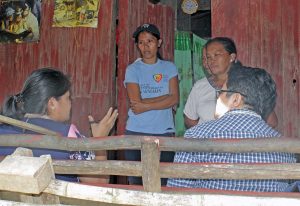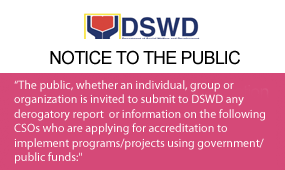
SURIGAO DEL SUR – As one of the national agencies working towards the achievement of the Sustainable Development Goals, the Department of Social Welfare and Development (DSWD) Caraga through the Pantawid Pamilyang Pilipino Program (4Ps) recently accommodated a delegation of 11 visitors representing World Bank (WB), United Nations Children’s Fund (UNICEF), Asian Development Bank (ADB), Department of Finance, and DSWD NPMO who convened to visit project sites in Tandag City and Bayabas last June 14-15, 2018.
The main objective of the visit is to assess the 10-year implementation of the Program in Caraga. The visit was led WB Senior Economist Pablo Acosta along with Rashiel Velarde, Angelo Santos and Aisha De Guzman; UNICEF Mindanao Chief Andrew Morris and Dr. Rene Gerard Galera; ADB Consultant Atty. Claire Luczon; DOF Planning Officer Mark Biscara; and staff from DSWD NPMO, RPMO, and POO.

The development partners commended the program implementation by saying that Pantawid Pamilya generally performed well in Caraga. SE Pablo Acosta specified the factors and said, “There is a high compliance in education and health for both RCCT and MCCT beneficiaries, this includes the timely delivery of payments or cash grants. We also observed that people strongly appreciate the program’s continued assistance to families and communities in support to their basic necessities.”
During the field visit, they surveyed some of the school facilities, health centers, and venues for Focus Group Discussion (FGD), conversing with Local Government Units (LGUs), Civil Society Organizations (CSOs), Non-Government Organizations (NGOs), NGAs, and program-beneficiaries. Furthermore, they measured how effective the Program is in alleviating poverty, empowering disadvantaged individuals, improving the quality of life for families, and implementing legal and specialized programs which are directly lodged with the Department.
The exemplary collaboration of the Regional Office through the field staff and the LGUs is also highlighted during the exit conference where the findings were presented. “The LGUs have good knowledge on the Program and its conditionalities. They complement it with other programs and services such as the provision of nutritional interventions, free civil registrations, livelihood programs, learning centers, and others,” Acosta added.

However, they also presented general aspects or areas of improvement where the Program can still work with. They emphasized that some partners and beneficiaries have concerns about the program’s fairness. These include the exiting or transitioning phase wherein no clear definition of the tool or instrument for recertification in determining who among the beneficiaries are already able to leave the Program; pending accommodation of non-beneficiaries in CCT despite the long-time confirmation of their poverty status; slow updating and monitoring of children ages 0-5 despite the new policy being raised to improve their health conditions; and inefficient payment system.
MC Andrew Morris also strongly recommended to focus on the F1000 (first 1000 days) of children and include it in the targeting and monitoring scheme of the Program. “The Program needs to incorporate small children or it will lose relevance for 1,000 days of life. The right health and nutrition in their first 1,000 days will build their foundation that is beneficial in their ability to grow, learn, and earn in the future,” he said.

In his message, DSWD Undersecretary Camilo Gudmalin, National Deputy Project Director of Pantawid Pamilya, acknowledged the issues raised by the development partners. “These [findings] are all useful, the intention of the mission is to find out how it is on the field, how it is benefiting our partners, and how we’ll be able to enhance further our quality of delivery,” he said.
Gudmalin ended his message by challenging the field staff to do more. “There are a lot of things that we need to review during our own internal guidelines if we really want to serve the sectors who need us the most. We are one in this program, in this mission, in this campaign in providing good fighting hands to our poor families to end poverty.” ###(JOANA RICA P. MILLAMA/Social Marketing Unit/DSWD Field Office Caraga)


